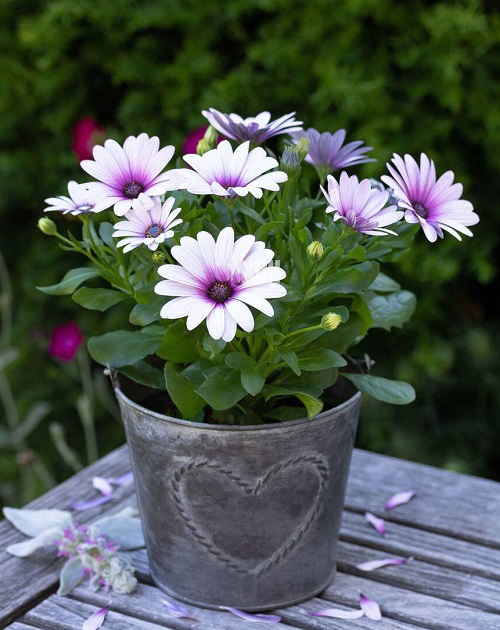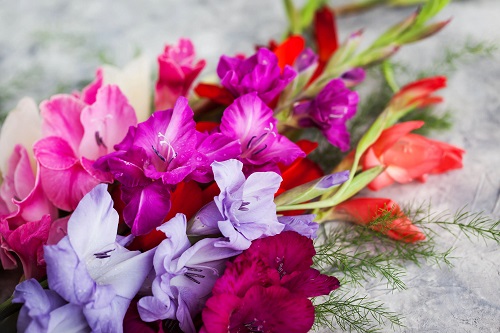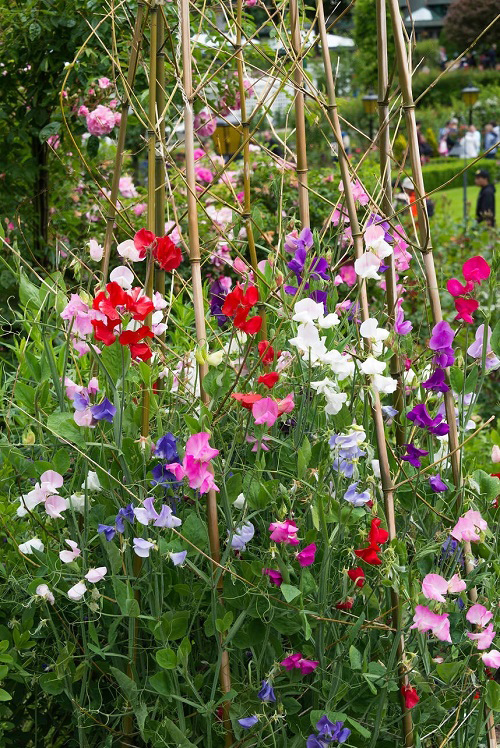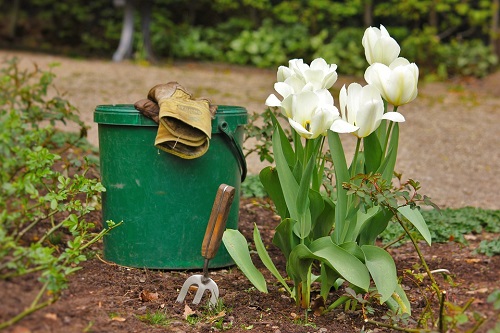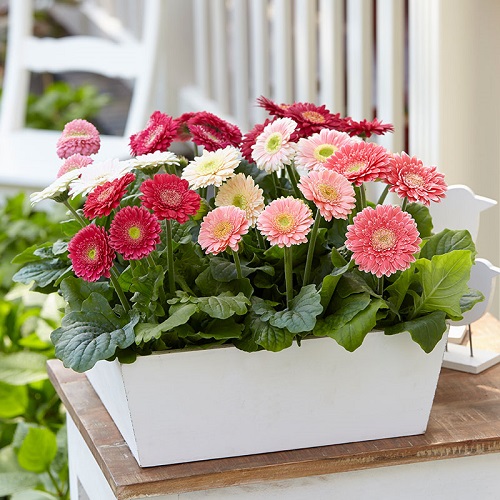Are you looking for the April Birth Month Flowers? Here’s a comprehensive guide that will give you all the details you need!
April is a beautiful month to celebrate a birthday with the flowers that bloom during this time. From daisies to sweet peas, let’s take a closer look at the April Birth Month Flowers.
Check out the best February birth month flowers here
What Is April Birth Month Flower?

April borns are fortunate to have four birth flowers associated with their birth month—Daisy, Sweat pea, Tulip, and Gerbera Daisy. These flowers possess distinct qualities and carry symbolic meanings that make them a perfect gift for those born in April.
April Birth Month Flowers
1. Daisy
Daisies bloom early in the morning as the sun rises, reflecting their photosensitive nature. Those born in April are believed to embody the flower’s positive energy and avoid negativity.
With delicate white petals and a bright gold center, daisies are often associated with the summer sun and positive aspirations. Interestingly, daisies are related to sunflowers, further emphasizing their connection to the warmth and energy of the sun.
The white petals of the daisy are often seen as a symbol of innocence, virtue, and morality, making them a great choice to gift to someone you hold in high esteem.
Daisy Flower Meaning
Daisies are commonly associated with innocence, purity, and new beginnings. The white petals and yellow center of the daisy are often seen as symbolic of a bright new day or a fresh start.
In Victorian times, daisies were used to symbolize true love, loyalty, and faithfulness. The flower’s simple beauty and enduring nature have made it a popular choice for many occasions, including weddings and baby showers, and as a gift to show appreciation or support.
Daisies can also represent inner strength, purity of thought, and the ability to keep a cheerful and positive outlook even in challenging times.
Daisy Flower: Origin and History
The daisy flower has a long and interesting history dating back to ancient times. The name “daisy” comes from the Old English word “daes eage,” which means “day’s eye,” referring to the way the flower opens and closes with the sun.
In ancient Egypt, daisies were used for medicinal purposes and were also seen as a symbol of fertility and motherhood. The ancient Greeks and Romans associated daisies with the goddess of love and fertility, and they were often used in weddings.
During the Middle Ages, daisies were associated with the Virgin Mary and were often included in religious art. In addition, the petals of the daisy were used to make a healing ointment for wounds.
In Victorian times, the language of flowers became popular, and daisies were seen as a symbol of innocence and purity. They were often included in bridal bouquets and were given as a token of love and friendship.
Daisies are native to central and northern Europe as well as Western Asia, and they originated as wildflowers in open fields in England. Their first known cultivation dates back to about 2,200 BC.
In ancient times, Egyptians used daisies as a remedy for various diseases, and even the English utilized them as a cure for stomach ulcers and eye problems.
Here are the best March birth month flowers
2. Sweet Pea
The Sweet Pea, or Lathyrus odoratus, is a climbing plant renowned for its butterfly-shaped flowers and sweet fragrance. These flowers are a common sight in gardens and bouquets, available in shades of violet, blue, white, red, and pink but not in orange and yellow hues.
Sweet Pea Flower Meaning
The sweet pea flower is a symbol of delicate or blissful pleasure, which makes it an appropriate gift for someone celebrating their April birthday. In the language of flowers, sweet pea also represents youth, purity, and innocence.
These meanings make the sweet pea a popular choice for wedding bouquets and other romantic occasions. The different colors of sweet pea flowers also have their own meanings.
Pink sweet peas symbolize appreciation and gratitude, while purple sweet peas represent royalty and dignity. White sweet peas signify purity and innocence, while red sweet peas symbolize passion and love.
Sweet Pea: History and Origin
Sweet peas, scientifically known as Lathyrus odoratus, are native to Sicily and southern Italy, where they were first discovered by a Franciscan monk named Francisco Cupani in the 17th century.
Cupani was so impressed by the sweet fragrance of the flower that he sent seeds to botanists across Europe, who began cultivating and hybridizing them.
Sweet peas became very popular in England during the Victorian era, where their delicate beauty and the sweet scent made them a favorite among gardeners and florists.
In the early 1900s, English plant breeder Henry Eckford began developing new varieties of sweet peas, which he called “Grandifloras.” These larger, more vibrant flowers quickly became a sensation, and the demand for sweet peas skyrocketed.
3. Tulip
Tulip is a popular spring-blooming flower known for its vibrant colors and striking beauty. It belongs to the Liliaceae family. This flower is native to Central Asia and Turkey and was first cultivated in the Ottoman Empire.
Today, they are widely grown and enjoyed in gardens and floral arrangements around the world. They come in a variety of colors, including red, yellow, pink, purple, and white, and their cup-shaped blooms can range in size from a few inches to over a foot in diameter.
Tulip Flower Meaning
Tulips are known for their bright and cheerful colors, making them a popular choice for gardens and floral arrangements. In addition to their beauty, tulips also carry a variety of meanings depending on their color.
Red tulips symbolize true love, while yellow tulips are associated with cheerful thoughts and sunshine. White tulips represent forgiveness and purity, while purple tulips are often used to convey royalty and admiration. Overall, tulips are a symbol of spring, renewal, and the fleeting nature of life.
Tulip: History and Origin
Tulips have a long and fascinating history that dates back to the Ottoman Empire in the 16th century. They were originally cultivated in Persia (modern-day Iran) and Turkey, where they were prized for their vivid colors and unique shapes.
Tulips soon became a popular luxury item and status symbol, and their popularity quickly spread throughout Europe.
In the Netherlands during the 17th century, tulips became so highly valued that they caused a period of economic speculation known as “tulip mania.” At the peak of the market, single tulip bulbs were being sold for more than the cost of a house.
4. Gerbera Daisy
Gerbera daisy (Gerbera jamesonii) is a type of flowering plant that belongs to the Asteraceae family. It is native to South America, Africa, and Asia.
They are commonly grown as ornamental plants for their large, colorful flowers, which can be up to 4 inches in diameter. The flowers come in a wide range of colors, including pink, red, orange, yellow, and white. They also have a long vase life, making them a popular choice for cut flowers.
Gerbera Daisy Flower Meaning
Gerbera daisies symbolize innocence, purity, and cheerfulness. They are also commonly associated with love and beauty, making them a popular choice for romantic occasions such as weddings and anniversaries.
In addition, gerbera daisies are believed to have healing properties and are often given as a gift to wish someone a speedy recovery. Overall, the gerbera daisy’s bright and vibrant appearance, along with its positive symbolism, make it a popular and meaningful choice for many occasions.
Gerbera Daisy: History and Origin
Gerbera daisies were first discovered in 1884 by a botanist named Robert Jameson in South Africa. They were later named after a German botanist, Traugott Gerber, who was a friend of Jameson.
The plant gained popularity in the 20th century and is now widely cultivated around the world, particularly in the Netherlands, where it is a major export crop.

